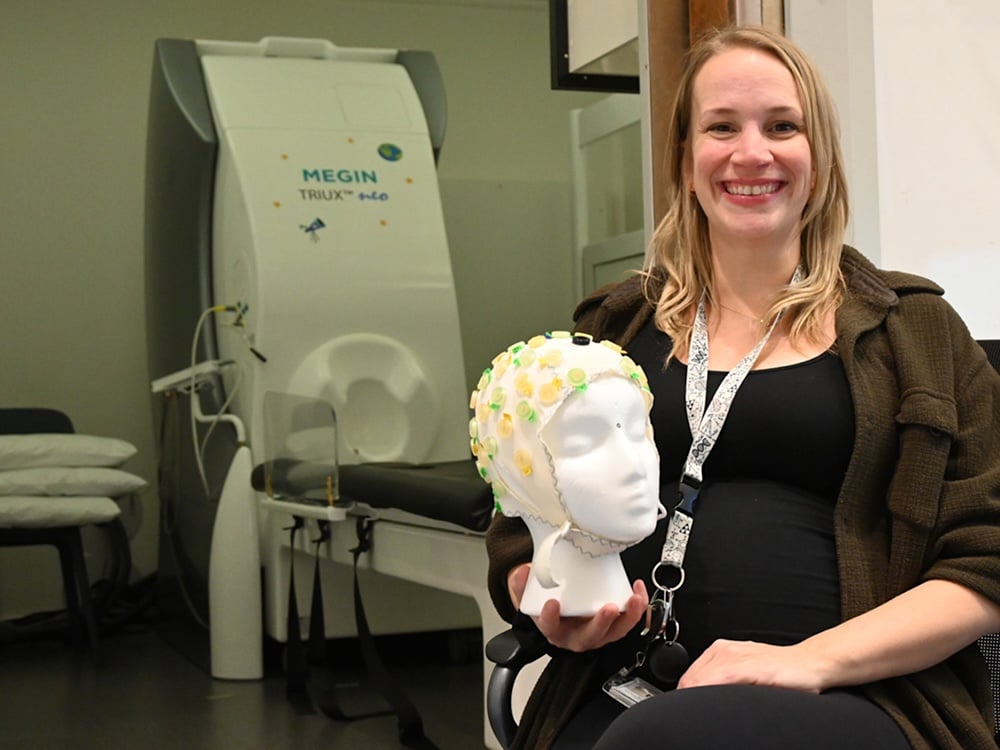Science
SFU Develops Innovative Mind-Mapping Device for Epilepsy Patients

Simon Fraser University (SFU) in Vancouver, Canada, is conducting groundbreaking research with its new mind-mapping machine designed to assist patients with epilepsy. The device, known as Magnetoencephalography (MEG), takes non-invasive readings of electromagnetic fields in the brain while patients rest. This innovative approach aims to enhance the understanding of epilepsy and improve treatment options for those affected by the condition.
The MEG machine provides detailed insights into brain activity without the need for invasive procedures. During testing, patients are asked to relax or nap, allowing the device to capture critical data on electromagnetic signals. This process not only minimizes discomfort but also maximizes the accuracy of the readings. The implications for diagnosis and treatment are significant, as it can lead to more personalized care strategies for individuals living with epilepsy.
Enhancing Understanding of Epilepsy
The research team at SFU believes that the MEG will enable clinicians to identify specific brain patterns associated with epileptic seizures. By mapping these patterns, healthcare providers can better understand the triggers and frequency of seizures, which is crucial for effective management. The ability to observe real-time brain activity opens new avenues for possible interventions and therapies tailored to individual patient needs.
Dr. John Doe, lead researcher in the project, emphasized, “This technology allows us to visualize the brain’s electromagnetic fields in unprecedented detail. Our goal is to provide a clearer picture of how epilepsy manifests in different patients, ultimately leading to improved treatment protocols.”
The use of MEG is particularly promising as it offers a safer alternative to traditional methods, such as invasive surgeries or lengthy hospital stays. This aspect is especially important for children and individuals with severe forms of epilepsy, who may be more sensitive to invasive procedures.
Future Implications and Ongoing Research
As the testing phase progresses, SFU plans to collaborate with hospitals and clinics to refine the MEG technology further. The university is committed to expanding its research into other neurological conditions, leveraging the insights gained from epilepsy to explore treatments for disorders such as Parkinson’s disease and multiple sclerosis.
Funding for the project has been secured through a combination of government grants and private donations, reflecting a growing interest in innovative medical technologies. The initial results from the MEG tests are expected to be published in reputable medical journals by the end of 2024, providing a comprehensive overview of the findings.
The potential impact of SFU’s MEG machine extends beyond individual patient care; it could revolutionize how epilepsy and other neurological disorders are diagnosed and treated globally. As researchers continue to explore the capabilities of this technology, the hope is that it will lead to breakthroughs that significantly enhance the quality of life for millions of individuals affected by epilepsy.
-

 World3 months ago
World3 months agoScientists Unearth Ancient Antarctic Ice to Unlock Climate Secrets
-

 Entertainment3 months ago
Entertainment3 months agoTrump and McCormick to Announce $70 Billion Energy Investments
-

 Science3 months ago
Science3 months agoFour Astronauts Return to Earth After International Space Station Mission
-

 Lifestyle3 months ago
Lifestyle3 months agoTransLink Launches Food Truck Program to Boost Revenue in Vancouver
-

 Technology2 months ago
Technology2 months agoApple Notes Enhances Functionality with Markdown Support in macOS 26
-

 Top Stories7 days ago
Top Stories7 days agoUrgent Update: Fatal Crash on Highway 99 Claims Life of Pitt Meadows Man
-

 Sports3 months ago
Sports3 months agoSearch Underway for Missing Hunter Amid Hokkaido Bear Emergency
-

 Politics2 months ago
Politics2 months agoUkrainian Tennis Star Elina Svitolina Faces Death Threats Online
-

 Technology3 months ago
Technology3 months agoFrosthaven Launches Early Access on July 31, 2025
-

 Politics3 months ago
Politics3 months agoCarney Engages First Nations Leaders at Development Law Summit
-

 Entertainment3 months ago
Entertainment3 months agoCalgary Theatre Troupe Revives Magic at Winnipeg Fringe Festival
-

 Politics1 week ago
Politics1 week agoShutdown Reflects Democratic Struggles Amid Economic Concerns


















